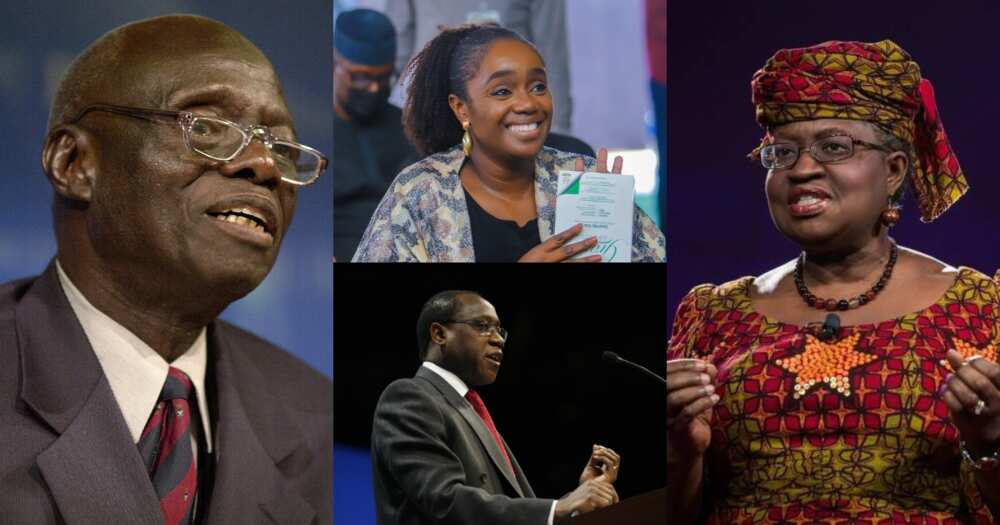Okonjo-Iweala, Aganga: List of Nigeria's Minister of Finance Since 1999 and Their State of Origin
Nigerians are anxious to know who would take over the helm of affairs at the Ministry of Finance following the deteriorated state of the country's economy.
Unlock the best of Legit.ng on Pinterest! Subscribe now and get your daily inspiration!
The position of finance minister is highly revered and arguably one of Nigeria's most coveted and vital offices.
Since 1999, the government has appointed eight finance ministers with names like Adamu Ciroma, Olusegun Aganga and Ngozi Okonjo-Iweala, who had two stints.
In the complex tapestry of a nation's economic journey, few positions hold as much significance as that of the Minister of Finance.
Since the dawn of Nigeria's democratic era in 1999, a succession of skilled individuals has stepped into this crucial role, steering the nation's fiscal policies, fostering economic growth, and navigating the challenges of a dynamic global landscape.
From seasoned economists to political maestros, each minister brings a unique blend of expertise, experience, and vision.

Source: Getty Images
PAY ATTENTION: Share your outstanding story with our editors! Please reach us through info@corp.legit.ng!
This short piece unveils not only the names and terms of these financial stewards but also offers insight into their origin, which reflects the diverse fabric of Nigeria's cultural and regional landscape.
1. Adamu Ciroma (1999-2003) - Yobe State
He's arguably one of the most decorated and experienced financial experts Nigeria has ever produced recently.
Before his stint as finance minister, Ciroma was once the Central Bank of Nigeria (CBN) governor under the administration of Murtala Mohammed.
Ironically, Ciroma was a historian without knowledge of banking/financial or monetary policies. His appointment as a CBN governor under the military administration of Murtala was said to have been a mistake that the Head of State refused to rectify and certified him as the CBN boss.
He later served as a trade and industry minister and a two-time presidential aspirant. He died at age 83 on 5th July 2018.

Read also
“Niger can thwart ECOWAS sanctions": Military-appointed PM sends strong words to West African leaders
2. Ngozi Okojo-Iweala (2003-2006) - Delta State
Ngozi Okonjo-Iweala is the most successful financial expert Nigeria and arguably Africa has produced. She is a distinguished Nigerian economist and international leader known for her exceptional contributions to global economic development and public service.
Born on June 13, 1954, in Ogwashi-Ukwu, Delta State, Nigeria, she boasts a remarkable academic background, having obtained degrees in economics from top-tier institutions, including Harvard University and the Massachusetts Institute of Technology.
Having served as Nigeria's Finance Minister on two separate occasions (2003-2006 and 2011-2015), her tenure was marked by efforts to combat corruption, enhance fiscal transparency, and promote economic diversification. Notably, she was pivotal in negotiating Nigeria's debt relief and championed reforms that bolstered financial stability and growth.
3. Nenadi Usman (2006-2007) - Kaduna State
Born Nenadi Esther Usman on 12 November 1966 in Jere, Borno, the former finance minister, had a short stint in office.
Much was not heard of her during her stint as minister of finance.
She was elected Kaduna South Senatorial District senator in the April 2011 elections, running on the People's Democratic Party (PDP) platform.
4. Shamsudden Usman (2007-2009) - Kano State
The former minister of finance also had a short stint in office. He's arguably one of Nigeria's most decorated finance ministers recently produced.
His academic journey started at King's College in Lagos State and proceeded to ABU Zaria, where he studied economics.
At the London School of Economics and Political Science, University of London, he bagged his M.Sc. and PhD, respectively.
Dr Usman was Executive Director of the International and Investments Sector of United Bank for Africa (UBA) between 1992 and 1993 and Executive Director, Corporate and International Banking Union Bank of Nigeria Plc. from April 1993 to October 1994.
In October 1994, Dr Usman was appointed Managing Director/Chief Executive NAL Merchant Bank Plc, where he was appointed a Deputy Governor in charge of Domestic Monetary and Banking Policy in the Central Bank of Nigeria in June 1999.
5. Mansur Mukhtar (2009-2010) - Borno State
Mansur Mukhtar is another King’s College Lagos and Ahmed Bello University (ABU) Zaria product.
He served as Executive Director of the African Development Bank (AfDB) (2007-2008) and as Director-General of Nigeria’s Debt Management Office (2003-2007).
He has also served as Deputy General Manager Strategic Management and Economics division of the United Bank for Africa (UBA) Plc. And as a Distinguished Fellow at the Center for the Study of Economies of Africa in Abuja.
6. Olusegun Aganga (2010-2011) - Ekiti State
Olusegun Aganga is a renowned and accomplished economist recognised for his significant contributions to Nigeria's economic policy and development. Born on July 22, 1955, in Lagos, Nigeria, Aganga's educational journey took him to prestigious institutions, including the London School of Economics and Political Science (LSE) and the University of Oxford.
Armed with a solid academic foundation, he embarked on a distinguished career that combined expertise in economics with leadership roles in both the public and private sectors.
Aganga's notable tenure as Nigeria's Minister of Finance from 2010 to 2011 showcased his commitment to fiscal management and economic reform. During his term, he championed policies to diversify the nation's economy and reduce its dependence on oil revenues. His efforts included initiatives to enhance infrastructure development, boost manufacturing, and attract foreign investment.
7. Ngozi Okonjo-Iweala (2011-2015) - Delta State
Ngozi Okonjo-Iweala was so good and valuable that she returned for a second stint as finance minister under the administration of ex-President Goodluck Ebele Jonathan.
Her influence transcends national borders, as demonstrated by her groundbreaking appointment as the Director-General of the World Trade Organization (WTO) in 2021.
She became the first woman and African to hold this prestigious position, underscoring her dedication to promoting inclusive global trade and economic cooperation.
8. Kemi Adeosun (2015-2018) - Ogun State
Kemi Adeosun gained prominence for her roles in the Nigerian government, particularly as the Minister of Finance from 2015 to 2018.
Adeosun's tenure as Minister of Finance was marked by her efforts to improve fiscal transparency and accountability in Nigeria's financial systems. She played a crucial role in initiatives to boost revenue generation, tackle corruption, and implement economic reforms.
However, her time in office was also marred by controversies, particularly concerning her National Youth Service Corps (NYSC) exemption certificate.
In September 2018, due to the controversy surrounding her NYSC certificate, Kemi Adeosun resigned from her position as Minister of Finance. Her resignation sparked discussions about ethical conduct and the vetting of government officials in Nigeria. The incident highlighted the importance of integrity and transparency in public service.
9. Zainab Ahmed (2018-2023) - Kaduna
Born on June 16, 1960, she obtained her bachelor's degree in accounting from Ahmadu Bello University and later earned a master's degree in business administration from Ogun State University.
Zainab Ahmed has held several pivotal roles in the Nigerian government. Notably, she assumed the position of Nigeria's Minister of Finance, Budget, and National Planning in 2018. Her tenure in this role has been marked by strategic fiscal policies that foster economic growth, reduce fiscal deficits, and enhance transparency in public financial management.

Read also
Niger vs ECOWAS: Reno Omokri sends strong warning message to APC, PDP, Labour Party leaders
Zainab Ahmed's impact extends beyond her governmental responsibilities. She has strongly advocated for gender equality and women's empowerment in the economic sector, striving to create opportunities for women to excel in traditionally male-dominated fields.
Laolu Akande predicts finance minister, reveals solution to electricity in Nigeria
Meanwhile, Laolu Akande, former spokesperson of the ex-Vice President of Nigeria Yemi Osinbajo, has lauded President Bola Tinubu's decision to merge the power and gas sectors.
Akande also applauded the choice of Wale Edun and Ali Pate, saying they are brilliant technocrats who would bring their experience and competence to the job.
The spokesman also postulated the portfolio likely to be given to Nasir El-Rufai and Lateef Fagbemi.
Source: Legit.ng





